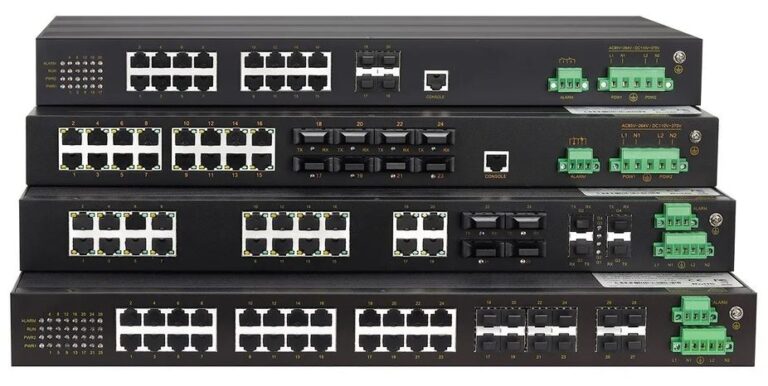
What is Industrial Ethernet Solution?
Industrial Ethernet solution is a specialized implementation of Ethernet technology with industrial Ethernet switch, which is commonly used for networking in industrial applications with industrial Ethernet cables. It is designed to meet the specific requirements and challenges of industrial environments, where factors like robustness, reliability, determinism, and real-time communication are crucial.
In order to meet the high-availability and high-performance requirements of intelligent automation and process-control applications found in manufacturing environments, industrial Ethernet solutions rely on specialized devices that can withstand adverse environmental conditions.
Here are some key features and aspects of Industrial Ethernet:
Robustness: Industrial Ethernet components are built to withstand harsh industrial conditions, including extreme temperatures, humidity, dust, and vibrations. They are often housed in ruggedized enclosures to ensure their durability.
Real-time Communication: Industrial processes often require real-time communication for precise control and monitoring. Industrial Ethernet protocols are designed to support deterministic communication, ensuring that data is transmitted reliably and with minimal latency.
Determinism: In industrial settings, it’s crucial that data packets arrive at their destination within a predictable timeframe. This is known as determinism. Industrial Ethernet protocols, such as PROFINET, EtherNet/IP, and Modbus TCP/IP, are designed to provide deterministic communication, which is essential for applications like automation, robotics, and process control.
Redundancy: To enhance reliability, Industrial Ethernet networks often incorporate redundancy mechanisms. This means that if one network component fails, there is a backup path to maintain communication and prevent downtime.
Security: Industrial Ethernet systems must also be secure to protect against unauthorized access and potential cyber threats. Security features like authentication, encryption, and access control are typically implemented in industrial Ethernet networks.
Scalability: Industrial Ethernet networks can be scaled to accommodate a wide range of devices and applications. This scalability allows industries to expand their networks as their needs grow.
Compatibility: While Industrial Ethernet protocols have unique features for industrial applications, they are still based on the Ethernet standard, which ensures compatibility with standard Ethernet devices. This means that industrial equipment can be integrated into broader Ethernet networks when necessary.
Protocols: There are several Industrial Ethernet protocols in use today, including PROFINET, EtherNet/IP, Modbus TCP/IP, and more. Each of these protocols may have unique features and advantages, catering to specific industrial requirements.
Industrial Ethernet has become increasingly important as industries adopt automation and the Industrial Internet of Things (IIoT) to improve efficiency, productivity, and control over industrial processes. It provides a reliable and robust communication infrastructure for connecting sensors, actuators, controllers, and other devices in industrial settings, enabling better data collection, analysis, and decision-making.
Ruggedized Industrial Ethernet solutions refer to networking technologies and equipment designed specifically for use in industrial environments. These environments have unique requirements and challenges that are distinct from typical office or residential networking setups. Industrial Ethernet solutions aim to provide reliable, high-performance, and secure connectivity for various industrial applications while accommodating the harsh conditions and demands of industrial settings.
Key features and aspects of industrial Ethernet solutions include:
1. Reliability: Industrial networks often operate critical systems, such as manufacturing processes, automation, and control systems. Therefore, reliability is paramount to ensure uninterrupted operations. Industrial Ethernet solutions are designed to provide high levels of reliability and availability.
2. Deterministic Performance: Timing and predictability are crucial in industrial applications. Industrial Ethernet solutions often include features that ensure consistent and low-latency communication, which is essential for tasks like real-time control and synchronization of devices.
3. Robustness: Industrial environments can expose networking equipment to extreme temperatures, humidity, dust, vibrations, and other harsh conditions. Industrial Ethernet solutions are built to withstand these challenges and maintain consistent performance under adverse circumstances.
4. Security: Industrial networks need to be secure to prevent unauthorized access, data breaches, and potential disruptions. Security features in industrial Ethernet solutions may include robust authentication, encryption, network segmentation, and intrusion detection.
5. Scalability: Industrial networks can range from small setups to complex systems spanning large areas. Industrial Ethernet solutions are designed to be scalable to accommodate various sizes of networks and future expansions.
6. Compatibility: Many industrial Ethernet solutions are designed to work with existing legacy industrial protocols, ensuring seamless integration with older equipment while providing a path for future technology adoption.
7. Industrial Protocols: Industrial Ethernet solutions often support specialized industrial protocols such as Modbus TCP, PROFINET, EtherNet/IP, and more. These protocols are optimized for industrial applications and provide features like data prioritization, device management, and diagnostics.
8. Redundancy: To enhance reliability, industrial Ethernet solutions often offer redundancy mechanisms such as redundant paths, devices, and power supplies to ensure network availability even in case of failures.
9. Remote Monitoring and Management: Many industrial Ethernet solutions allow for remote monitoring, configuration, and management of network devices. This feature is especially valuable for maintaining and troubleshooting networks located in remote or difficult-to-access locations.
10. Industrial-Grade Hardware: Industrial Ethernet solutions use components and devices that are built to withstand industrial conditions. These can include ruggedized switches, routers, connectors, and cabling designed to handle extreme temperatures, mechanical stress, and electromagnetic interference.
Industrial Ethernet solutions find applications in a wide range of industries, including manufacturing, energy, transportation, utilities, oil and gas, and more. They play a crucial role in enabling the Industrial Internet of Things (IIoT) and Industry 4.0 initiatives by providing the necessary connectivity for smart devices and systems in industrial environments.